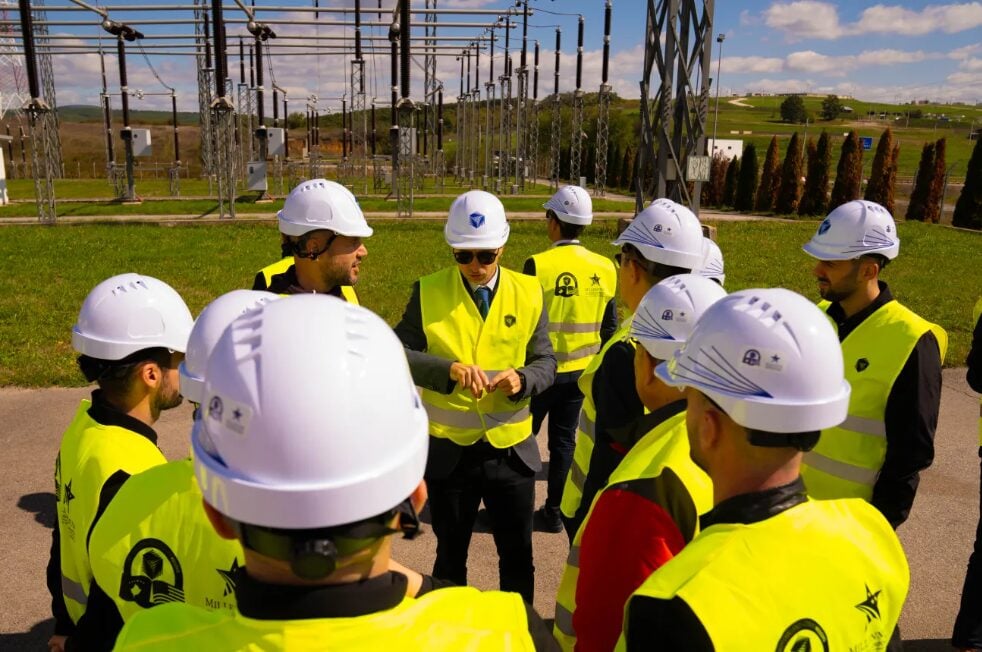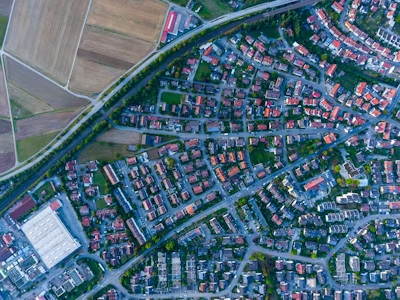
Louth County Council has embarked on a groundbreaking initiative with the construction of Ireland’s first-ever 3D printed social housing project in Dundalk, County Louth. This project, named Grange Close, represents a significant step forward in sustainable and efficient housing solutions. The project is a collaborative effort between Louth County Council, Louth & Meath Education & Training Board (LMETB), Harcourt Technologies Ltd (HTL.tech), and Roadstone Ltd. It aims to utilize 3D Construction Printing (3DCP) technology to deliver high-quality and sustainable social housing in a shorter timeframe compared to traditional methods. The 3DCP technology utilizes large printers to build three-dimensional structures layer by layer on-site. This innovative approach reduces construction time by up to three times, streamlining the process and potentially offering a solution to Ireland’s growing housing shortage. Joan Martin, chief executive at Louth County Council, said: “Louth County Council is proud to collaborate with LMETB, Harcourt Technologies Ltd (HTL.tech), and Roadstone Ltd to deliver what is a very significant pilot project at Grange Close, Dundalk. The provision of high quality and sustainable social housing is a core objective of Louth County Council, and this project is a significant example of the use of innovative technologies and organisational collaboration in the delivery…

The European Bank for Reconstruction and Development (EBRD) is pleased to announce a $65 million financing package to support the development of a renewable hydrogen facility in Uzbekistan. This project marks a significant step towards decarbonizing the country’s industrial sector, particularly the fertilizer industry. The facility, a joint venture between ACWA Power and Uzkimyosanoat, will feature a 20 MW electrolyzer and a 52 MW wind power plant. By utilizing renewable energy sources, the project aims to replace traditional, carbon-intensive hydrogen production methods with a cleaner and more sustainable alternative. “EBRD is proud to finance this landmark renewable hydrogen facility in Uzbekistan with our long-standing partner ACWA Power and their partner Uzkimyosanoat. This is the first of its kind across Central Asia, a region with some of the most carbon-intensive and hard-to-abate industries” said Nandita Parshad, EBRD Managing Director for the Sustainable Infrastructure Group, EBRD. The EBRD’s financing package includes a $55 million senior loan and up to $10 million in concessional finance from the Special Fund for the High Impact Partnership on Climate Action (HIPCA). Additionally, the Bank is considering an equity bridge loan of up to $5.5 million. Once operational, the facility is expected to produce up to 3,000 tonnes…

Europe’s energy landscape is undergoing a significant transformation, driven by the increasing adoption of renewable energy sources and the need for reliable grid infrastructure. In a major development, the Millennium Challenge Corporation (MCC) has announced plans to procure 340 MWh of battery energy storage systems (BESS) for two projects in Kosovo. This investment, totaling US$202 million, aims to enhance grid stability and support the country’s transition to clean energy. Meanwhile, in Switzerland, Intilion, a leading system integrator, has been selected by Primeo Energie to deliver a 65 MWh BESS project in Solothurn. This project will contribute to the flexibility and reliability of the Swiss power grid. These projects highlight the growing importance of energy storage in balancing the intermittent nature of renewable energy sources. As more renewable energy is integrated into the grid, energy storage solutions like BESS become essential for ensuring a stable and reliable power supply. These developments underscore Europe’s commitment to a sustainable energy future and its role as a global leader in clean energy technologies.

SSEN Transmission has submitted a planning application to Aberdeenshire Council for the development of the Hurlie 400kV substation, a crucial component of its proposed Kintore to Tealing 400kV overhead line connection. This project aims to enhance the UK’s energy infrastructure and support the integration of renewable energy sources, particularly offshore wind farms. The new substation, which will be located in Fetteresso Forest, will play a vital role in transmitting clean energy across the country. SSEN Transmission has carefully considered community feedback and has implemented measures to minimize the project’s visual impact. These include a reduced substation size and the incorporation of landscape and screening measures. Calum Grant, Senior Development Project Manager at SSEN Transmission, said: “The Hurlie substation is a key part of our proposals to support the delivery of 2030 offshore wind generation targets. By investing in our electricity transmission network, we are contributing to the UK’s energy security and clean power objectives.” The project is expected to generate significant economic benefits for the region, creating jobs and stimulating local businesses. SSEN Transmission remains committed to working closely with Aberdeenshire Council and local stakeholders throughout the planning process.

YPF S.A. today announced its participation in the Vaca Muerta Sur pipeline project, a significant infrastructure development in Argentina. YPF, as a shareholder in VMOS S.A. alongside Vista Energy Argentina S.A.U., Pampa Energía S.A., and Pan American Sur S.A., will contribute to the construction of a 437-kilometer crude oil export pipeline. The project, approved at the recent VMOS board meeting, will feature a loading and unloading terminal with interconnected monobuoys and a tank and storage yard. Construction is set to commence immediately with the goal of achieving mechanical completion by the fourth quarter of 2026 and commencing commercial operations on July 31, 2027. The project, with a design capacity of 550,000 barrels per day, represents the largest hydrocarbon export infrastructure in Argentina. It will require an investment of approximately US$3 billion, financed by shareholder contributions and external funding. YPF has committed to a transport capacity of 120,000 barrels per day and will hold a minority shareholding in VMOS. The company will seek to leverage the Argentine government’s Incentive Regime for Large Investments (RIGI) to support this critical infrastructure project. This strategic investment aligns with YPF’s commitment to developing Argentina’s energy resources and strengthening the country’s position as a key player…

Qualitas Energy has announced the acquisition of a wind farm undergoing repowering in Lower Saxony, Germany. The 32-turbine wind farm, located on the German North Sea coast, has been operational since 1998 and is currently undergoing a significant upgrade. The repowering project involves replacing existing turbines with five new, more efficient models. This upgrade will increase the wind farm’s total output from 17.2MW to 21.6MW, leading to increased energy production and more sustainable power generation for over 14,000 households. “This acquisition expands our wind energy portfolio with a highly promising project in an excellent wind location,” said Johannes Overbeck, Head of Investment at Qualitas Energy Deutschland. “Qualitas Energy is committed to a long-term strategy of identifying and developing high-quality renewable energy projects, contributing to the acceleration of the energy transition.” This acquisition adds to Qualitas Energy’s growing portfolio of over 100 projects in Germany. The company is actively pursuing its goal of reaching a total capacity of 4GW in the German market. This expansion is supported by €1.2 billion in funding from Qualitas Energy Fund V, which closed in 2022. Qualitas Energy Deutschland, a subsidiary of Qualitas Energy, specializes in the acquisition, financing, development, construction, and operation of onshore wind…

Orihuela Town Hall has partnered with the Norwegian foundation NORSAR to participate in the European Horizon project, TOGETHER. This initiative aims to enhance early warning systems and disaster management strategies across Europe. The project, which focuses on integrated governance for effective disaster management, will develop a comprehensive toolkit that includes innovative technologies and best practices. This toolkit will be tested in various European countries, including Spain, to assess its effectiveness in different contexts. By joining the TOGETHER project, Orihuela will benefit from the expertise of international partners and gain access to cutting-edge technologies. The city will also have the opportunity to contribute to the development of a more resilient and disaster-prepared Europe. Orihuela’s participation in the project is particularly significant given its vulnerability to natural disasters, such as floods and earthquakes. By implementing the project’s recommendations, the city aims to strengthen its capacity to respond to emergencies and mitigate the impact of future disasters. This collaboration underscores the importance of international cooperation in addressing global challenges, such as climate change and natural disasters. By sharing knowledge and resources, countries can work together to build a more resilient future.

A groundbreaking project to harness the power of the River Mersey for clean energy generation has taken a significant step forward. The proposed Mersey Tidal project, led by the Liverpool City Region Combined Authority (LCRCA), aims to construct a tidal barrage that could power hundreds of thousands of homes and create thousands of jobs. The project has garnered significant attention, with Prime Minister Keir Starmer expressing support for the initiative. Initial discussions have also been held with Great British Energy, the government’s new energy company, to explore potential collaborations and accelerate the project’s development. The LCRCA has recently completed a public consultation, which received over 2,500 responses. The feedback gathered from the consultation will be used to refine the project’s design and environmental impact assessment. Beyond its potential as a clean energy source, the Mersey Tidal project offers additional benefits. It could facilitate the creation of a new cycling and pedestrian route across the river, enhancing connectivity between Liverpool and Wirral. Additionally, the project could play a crucial role in mitigating the risks associated with climate change, such as coastal flooding. The LCRCA is actively working with key stakeholders, including marine users and government departments, to align the project with…

Construction has commenced on the Greener Grid Park, a significant infrastructure project aimed at enhancing the stability of the UK’s electricity grid. The project, led by Statkraft, will utilize innovative technology to support the integration of renewable energy sources. The groundbreaking ceremony, attended by Welsh First Minister Eluned Morgan and Norwegian Ambassador Tore Hattrem, marked the start of construction on the site. The project will involve the installation of six large rotating stabilizers, which will replicate the function of traditional power plants in maintaining grid stability. By using these advanced technologies, the Greener Grid Park will help to reduce reliance on fossil fuels and contribute to the UK’s net-zero emissions goals. The project is expected to deliver significant benefits, including a more reliable and affordable energy supply for households and businesses. “Wales’ electricity needs could treble by 2050, so it’s important that infrastructure like Statkraft’s Greener Grid Park in Swansea is in place to support the grid and ensure it can cope with the increasing demand in the most efficient and environmentally friendly way,” said First Minister Eluned Morgan. Energy Minister Michael Shanks added, “This is a huge milestone as work begins on the clean power grid stability scheme in…

A groundbreaking cross-border project has been awarded £26 million to address water pollution issues in the Fermanagh, Tyrone, Leitrim, Sligo, Cavan, Monaghan, and Donegal regions. The Water Enhancements through Sustainable Treatment (West) project, a joint initiative between NI Water and Uisce Éireann, aims to improve water quality in Lough Erne, Lough Melvin, and Donegal Bay. These areas have been affected by pollution from agriculture, forestry, urban runoff, and wastewater discharges. The project will involve the development of comprehensive catchment management plans and the implementation of innovative wastewater treatment solutions. By addressing these issues, the project will benefit local communities, the environment, and the tourism industry. SEUPB chief executive Gina McIntyre said: “Our natural environment is one of our most important assets and continued enhancement and protection is critical to future economic and social development. “A clean, green and accessible environment makes a major contribution to people having long, active, healthy lives as well as creating a place where people want to live, visit and invest. With environmental pressures going beyond borders, the innovative West project considers the entire catchment as a single ecosystem, aiming to promote a greener, lower-carbon environment and decrease threats to local natural habitats. Underpinned by a…










